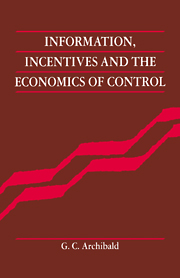Book contents
- Frontmatter
- Contents
- Preface
- Part I Introductory
- Part II Iterative controls
- 3 Feed-back control processes
- 4 First example: an externality problem
- 5 Second application of the control process: Lerner's Problem
- 6 Third example of the control process: implementation of a second-best solution
- 7 Two examples of the control process in a mixed economy
- Part III Non-convexities
- Part IV Cooperatives
- Appendix: The taxation of economic rent
- Notes
- Bibliography
- Index
5 - Second application of the control process: Lerner's Problem
Published online by Cambridge University Press: 19 October 2009
- Frontmatter
- Contents
- Preface
- Part I Introductory
- Part II Iterative controls
- 3 Feed-back control processes
- 4 First example: an externality problem
- 5 Second application of the control process: Lerner's Problem
- 6 Third example of the control process: implementation of a second-best solution
- 7 Two examples of the control process in a mixed economy
- Part III Non-convexities
- Part IV Cooperatives
- Appendix: The taxation of economic rent
- Notes
- Bibliography
- Index
Summary
Planning, regulation, and agency
I call this “Lerner's Problem” although it has emerged in recent literature under other labels, particularly “The Incentive Problem for a Soviet-style Manager.” I think that a brief digression to explain my title may be in order.
I imagine that many students of my generation were brought up, as I was, to speak (in an oral tradition) of “Lerner–Lange socialism.” Even a casual re-reading of their work (Lerner, 1944; Lange, 1936/7) is sufficient to show that the hyphen is inappropriate. Lange's contribution was to suggest that the Central Planning Board (henceforth CPB) should announce prices rather than quantities. This is in the tradition of Taylor (1929) rather than of Barone (1908). The advantages of announcing prices rather than quantities were two, one perhaps trivial, the other more serious. The first is that it might be technically easier to solve the dual than the primal problem. This, we now know, is a little trivial: if we have the information and computational facilities to solve one, we can solve the other. The second advantage is important. Lange, like Taylor, thought that by announcing only prices, the CPB could achieve a large measure of decentralization: given prices, economic agents could be left to “get on with it,” maximizing on their own account, and thus reproducing, or “choosing,” the quantities which would have emerged from a solution to the primal problem, without any need for concern with implementation.
- Type
- Chapter
- Information
- Information, Incentives and the Economics of Control , pp. 55 - 69Publisher: Cambridge University PressPrint publication year: 1992



